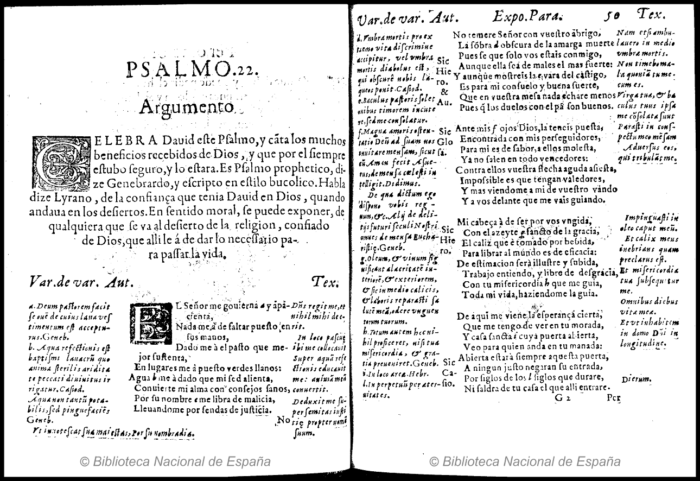Exposicion paraphrastica
Exposicion paraphrastica
del psalterio de Dauid [Texto impreso] : en diferente genero de verso español, con exposiciones varias, de varios y grauissimos autores, con la tabla de todos los psalmos y sus autores
by Yanet Hernandez
Original Bibliographical Notice
- Author: Juan de Soto
- Title: Exposicion paraphrastica del psalterio de Dauid [Texto impreso]: en diferente genero de verso español, con exposiciones varias, de varios y grauissimos autores, con la tabla de todos los psalmos y sus autores
- Date: 1612
- Edition: Alcala (current Alcalá de Henares, Spain)
- Editor: Luys Martinez Grande
- Pages: [15] sh., [1] bl., 398, [4] sh.
- Language: Spanish (es) and Latin (lat)
- Source:http://bdh-rd.bne.es/viewer.vm?id=0000121944&page=1
Purpose
All 150 psalms were translated, in the form of a periphrastic translation, into Castilian verse as the original was written in verse and also to avoid censure. It was intended for readers to enjoy and understand well so they could praise and worship the Lord God.
Formal aspects
Beautiful edition in Latin and Spanish currently found on the Biblioteca Digital Hispánica at the Biblioteca Nacional de España [National Library of Spain]. Text in three columns: 1. various expositions (commentary by important authors) in Latin, 2. Periphrastic translation into Spanish and 3. Psalm in Latin. It includes an in-depth linguistic analysis of the periphrastic translation and comments, a prologue, a sonnet to the author, and a dedication to the Serenísima Sor Margarita de la Cruz, monja descalza de la orden de Santa Clara de Madrid. Alphabetical index of Psalms and their authors.
Each translation is accompanied by a comentario (commentary on the psalm) followed by the periphrastic translation in the three column format, ending in a per oración (sort of summary and moral of the psalm).
Ornate edition with bandeau, ornate letter and cul-de-lampe per section. Typography consistent with the time it was printed: Presence of long s and dissimilation of v and u, and I and j. Psalms numbered in Arabic numbers without being divided into verses. References present in the text of the periphrastic translation in italic letters, in alphabetical order, to the commentary notes in Latin of the first column.
Value given to the edition
First edition of a periphrastic translation of a salterio in Castilian.
It did not receive, like many other works of this kind, much attention from critics, despite the attention these translations’ analysis and approach have gotten from several scholars.
According to Javier San José Lera from the University of Salamanca in Spain in his article Fray Luis de León: traducción, poesía y hermenéutica [Fray Luis de León : translation, poetry and hermeneutics], critics overlook the hermeneutic approach of sacred texts’ periphrastic translations, since they define these translations as “ merely putting the Psalms in classical molds”.1
Political value
The lack of attention received comes from the fact that, as a faithful and comprehensible version of the Psalms in vulgar language, the catholic church at the time had no interest in letting people really enjoy them, since once people are able to get closer to the original text and fully understand it, they are more difficult to manipulate by the edicts of the church that do not go with the true values of the sacred text.
The Catholic Church did not like and even banned the translation of the Bible in vulgar languages, the Psalms being particularly banned since it was the book most used and commented by the Reformers. The Inquisition Codex of 1612 prohibited the translation of the Psalms if they were not to include explanations or allegories. Therefore, publishing a vulgar translation of the Psalms was risky at the time. Therein the title: Exposicion paraphrastica… con exposiciones varias, de varios y grauissimos autores [periphrastic exposition… with expositions from various and important writers], which justifies the explanations or allegories part of the ban as well as the total avoidance of the term translation.

Comparison of this version in periphrastic verse with a standard translation (Reina Valera 1569)
| [Los Salmos del santo Rey David [Texto impreso] / traducidos ó parafraseados en verso castellano por varios y diferentes metros.] | Standard translation (Reina Valera 1569) |
|---|---|
| Psalmo 22 | Salmo 23 |
| El Señor me govierna y apacienta Nada me à de faltar puesto en sus manos, Dado me à el pasto que mejor sustenta, | Psa 23:1 Salmo de David. El SEÑOR es mi pastor; no desfalleceré. |
| En lugares me à puesto verdes llanos: Agua me à dado que mi sed alienta, |
Psa 23:2 En lugares de delicados pastos me hará yacer; junto a aguas de reposo me pastoreará. |
| Convierte mi alma con consejos sanos, Por su nombre me libra de malicia, Llavandome por sendas de justicia. | Psa 23:3 Convertirá mi alma; me guiará por sendas de justicia por su nombre. |
| No temeré Señor con vuestro abrigo, La sombra d’obscura de la amarga muerte Pues se que solo vos estais conmigo, Aunque ella sea de males el mas fuerte: Y aunque mostréis la vara del castigo, Es para mi consuelo y buena suerte, | Psa 23:4 Aunque ande en valle de sombra de muerte, no temeré mal alguno; porque tú estarás conmigo; tu vara y tu cayado me confortarán. |
| Que en vuestra mesa nada echare menos Pues q’ los duelos con el pã son buenos. Ante mis ojos Dios, la teneis puesta, Encontrada con mis perseguidores, Para mi es de sabor, a ellos les molesta, Ya no salen en todo vencedores: Contra ellos vuestra aguda flecha aguda asiesta, Impossible es que tengan valedores, Y mas viéndome a mi de vuestro vando Y a vos delante que me vais guiando. Mi cabeza à de ser por vos ungida, Con el azeyte sancto de la gracia, El caliz que è tomado por bebida, Para librar al mundo es de eficacia: De estimación serà illustre y sabida, Trabajo entiendo, y libre de desgracia, | Psa 23:5 Aderezarás mesa delante de mí, en presencia de mis angustiadores; ungiste mi cabeza con aceite; mi copa está rebosando. |
| Con tu misericordia que me guía, Toda mi vida, haciéndome la guía. De aquí me viene la esperança cierta, Que me tengo de ver en tu morada, Y casa sancta cuya puerta abierta, Veo para quien and en tu manada: Abierta estarà siempre aquesta puerta, A ningun justo negaran su entrada, Por siglos de los siglos que durare, Ni saldrá de tu casa el que allí entrare. | Psa 23:6 Ciertamente el bien y la misericordia me seguirán todos los días de mi vida; y en la Casa del SEÑOR reposaré por largos días. |
Cited works
San José Lera Javier. Fray Luis de León : traducción, poesía y hermenéutica. In: Bulletin Hispanique, tome 105, n°1, 2003. pp. 51-97.
DOI : https://doi.org/10.3406/hispa.2003.5149
www.persee.fr/doc/hispa_0007-4640_2003_num_105_1_5149



